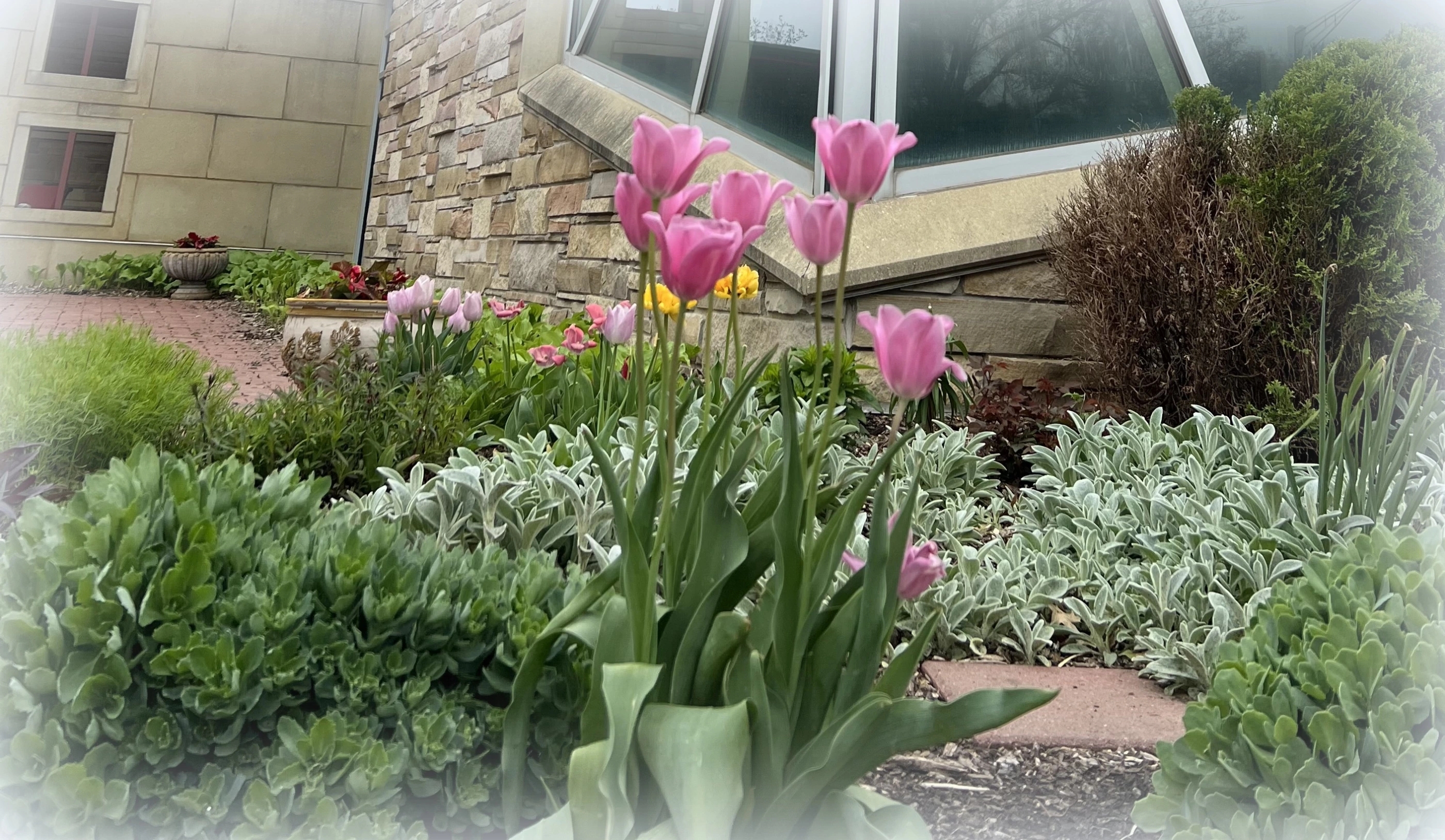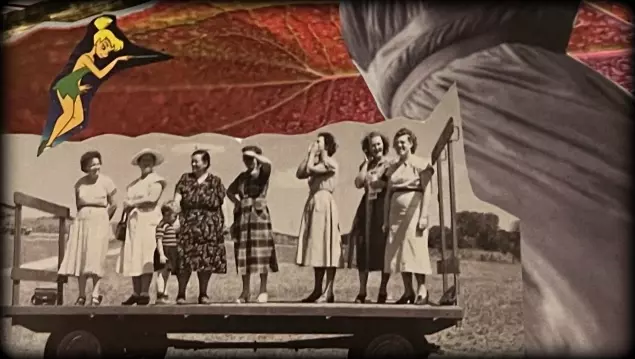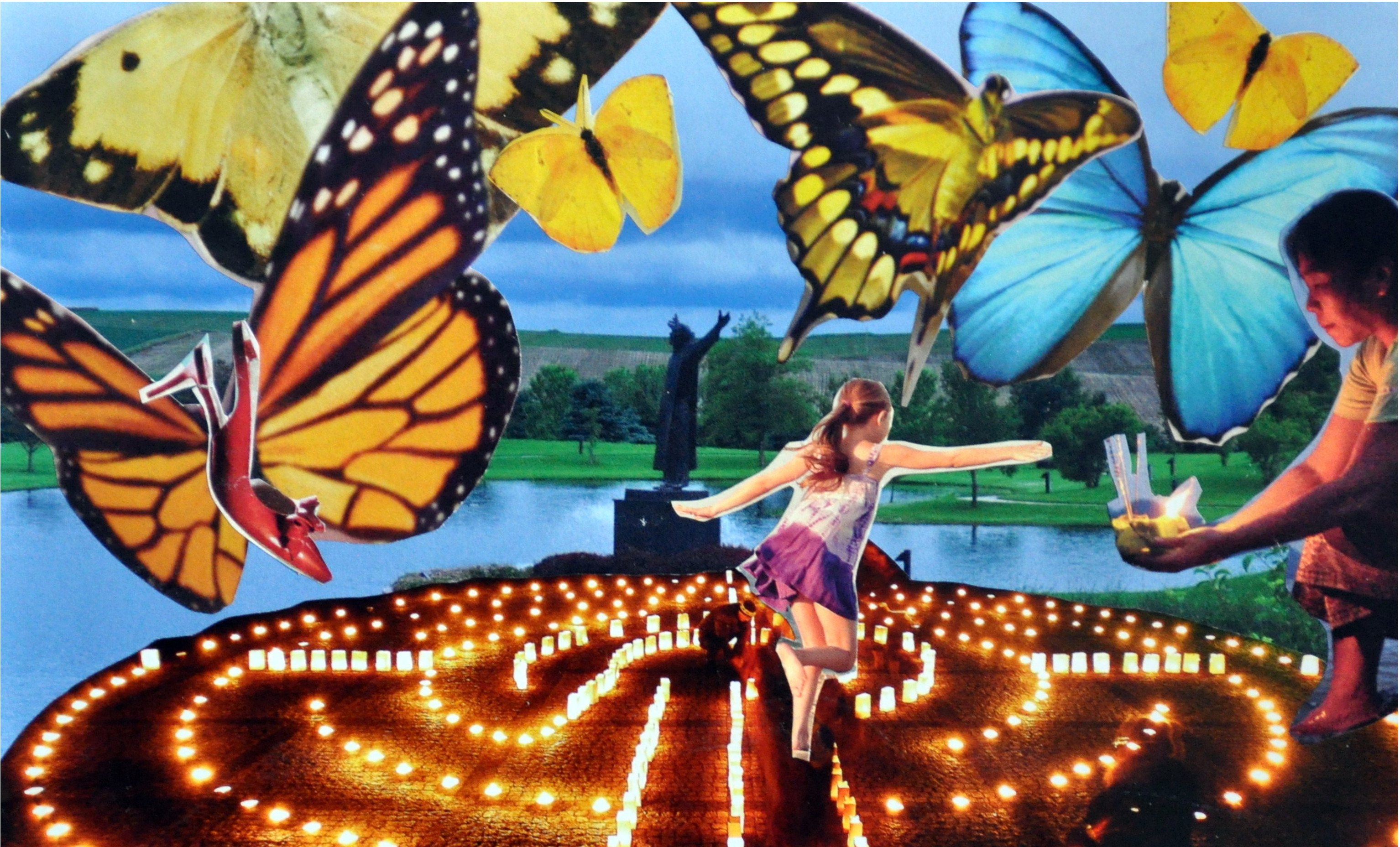I wonder about Hildegard.
Recently I shared this image and quote attributed to St. Hildegard of Bingen:

The quote and image so resonated with me, that I shared it on my Being Benedictine Facebook page. Just as I was posting it, two finches, as seen in the image, landed just a few feet away near the birdfeeder I received as a Mother’s Day gift, hung just the day before. (For more on my love of birdwatching, see Birds Are Still My Prayer.)

I love synchronicities like this, little holy surprises—the same birds, the same colors, the same postures, at the same moment I shared the image. It’s a whoa, you-need-to-pay-attention kind of moment. Curious, I began a deeper dive into what context Hildegard had made the statement.
I love Hildegard. I was enthralled with my visit to the Abbey of St. Hildegardin Germany on pilgrimage in 2019. I love that she was a 12th-century mover and shaker, truly a woman who used her voice. Hildegard, a German Benedictine nun, was a mystic and theologian, prophet and artist, poet, playwright and composer, healer, naturalist, and pharmacist. She became a Benedictine abbess, was both challenged and received affirmation from church clergy, bishops, and popes, moved her monastery of sisters to be independent of the male monastery, and, throughout her life, had visions of the Divine that she was reluctant, but ultimately encouraged, to share in writing.
But spoiler alert: The quote in the image is NOT a direct quote from St. Hildegard. It is from an article written ABOUT Hildegard. Here is some context I discovered that contains (closely) the quote from the shared image:
“We often look to someone like Hildegard or to other great people throughout the ages as if what they have is not ours to have; we admire them, honor them, study them. We want to make use of them, and we allow them to consummate our inner light for us. We allow them to be the still point of our turning world. We feel incapable, yet the world wants to infuse us and to be infused by us. At that point no one can help us, not angels, not men, not Hildegard, not Jung, not Rilke. We cannot live securely in a world which is not our own, in a world which is interpreted for us by others. An interpreted world is not a home. Part of the terror is to take back our own listening, to put our ears to our own inner voices, to see our own light, which is our birthright, and comes to us in silence.” (Source: Hildegard of Bingen, Warrior of Light, Elaine Bellezza, Gnosis magazine, vol 21, 1991)
The quote, incorrectly attributed to Hildegard of Bingen in sermons, social media posts, and even books, has been widely shared. There is no doubt that the image and quote need to be attributed correctly—to Elaine Bellezza not Hildegard of Bingen.
But, I wonder…
There must be something about the message that connects to one’s deepest longing, and that it is attributed to Hildegard, further captivates. The quote suggests that we feel the need to be validated in our becoming, in finding our own voice, and in listening to our own experience of God. But it can also feel terrifying to be alone on this Divine quest—perhaps it is easier, as the article suggests, to make the words of a famous saint like Hildegard, the voice we listen to. The purpose of our becoming is to do our own listening, see the Divine that presents itself in our own lives, and find our own way or voice to express that Divine love.
The message is Truth. I can see why someone somewhere, was attracted to the quote and accidentally attributed it to Hildegard.
I am not an expert on Hildegard, but I am a curious learner and I wonder…
Does the quote, despite being falsely attributed, capture some essence of Hildegard’s teaching or is it simply one writer’s commentary on Hildegard? It seems that the author Elaine Bellezza’s conclusions in the article support some of Hildegard’s writing. In Liber de Subtilitatum, Hildegard writes:
“Birds symbolize the power that helps people to speak reflectively and leads them to think out many things in advance before they take action. Just as birds are lifted up into the air by their feathers and can remain wherever they wish, the soul in the body is elevated by thought and spreads its wings everywhere.”
This quote highlights the importance of listening and contemplating deeply before speaking, which does not contradict the Belleza quote. And, it points to birds used as powerful spiritual symbols. Hildegard had visions for years before she finally shared them.
She writes about sharing her visions— “I am forced to write these words regarding which I would have gladly kept silent because I fear greatly the power of vain-glory. But I have learned to fear more the judgment of God should I, God’s small creature, keep silent.” (Matthew Fox, Illuminations of Hildegard of Bingen)
St. Hildegard is a role model for using our voice, not for our own gain or for vanity, and only after great reflection. I wonder if Hildegard encouraged others to find their voice. Would she encourage us to listen closely to how God comes into our lives as she did? I would think so, but humbly, we cannot put words into her mouth. So it comes down to this–
I loved the quote. I love Hildegard. I love birdwatching and I love the synchronicity of the birds in the image while I was sharing. I will continue to learn more about Hildegard and her teaching. And I’m going to be more careful about source checking in my writing.
Perhaps, Hildegard would be delighted by this.

Sources:
The Benedictine Tradition, Spirituality in History, Laura Swan
The Feminine Mystic, Readings from Early Spiritual Writers, Lynne M. Deming




June 14, 2023 at 2:06 am
I love this website
LikeLiked by 2 people
June 14, 2023 at 12:40 pm
I love the quote – thank you for fleshing out the author. and I so agree with it – It is the easy way out to read and agree rather than seek and know.
LikeLiked by 1 person
June 14, 2023 at 12:42 pm
Thank you for fleshing out the author. I agree that it is the easy way out to read and agree rather than seek and know.
LikeLike
June 21, 2023 at 8:24 am
Beautiful story. Thanks for sharing. I also love synchroncies like this. I was in fact writing a piece for children about Hildegard’s encounter with a bird. The same day I discovered this quote with exactly the same finch on it in the Hildegard FB group.
LikeLiked by 1 person
June 21, 2023 at 8:27 am
Oh I love this connection!! Please let me know how I can find this piece you are writing!! Thank you.
LikeLike
June 21, 2023 at 8:32 am
Will do when my text is finished. 🙂 I’m trying to write something for children about Hildegard’s childhood in Disibodenberg.
LikeLike